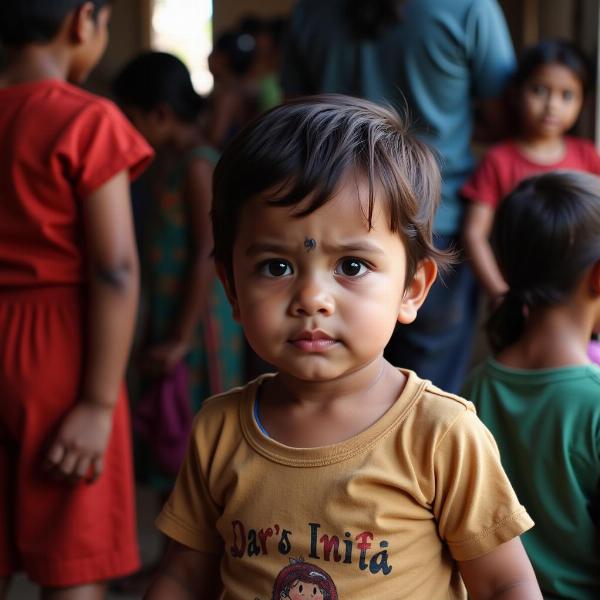Understanding the meaning of “foundling” in Hindi is crucial for navigating cultural and social contexts. This article explores the various terms used to describe a foundling, their legal implications, and the cultural nuances surrounding abandoned children in India. The term “foundling” refers to a deserted infant whose parents are unknown.
Defining “Foundling” in Hindi: Exploring Different Terms
Several Hindi words can be used to translate “foundling,” each carrying slightly different connotations. The most common term is अनाथ शिशु (anath shishu), which literally translates to “orphan child.” While not perfectly synonymous with “foundling,” it’s often used in similar contexts. Another term is लावारिस बच्चा (lawaris bachcha), meaning “unclaimed child.” This term emphasizes the lack of guardianship or known parentage. पारित्यक्त शिशु (parityakt shishu), meaning “abandoned child,” directly reflects the act of desertion. Finally, खोजा हुआ बच्चा (khoja hua bachcha), or “found child,” is a more literal translation of “foundling,” focusing on the discovery of the child.
 Foundling in Indian Orphanage
Foundling in Indian Orphanage
Legal Implications of Being a Foundling in India
The legal status of foundlings in India is complex. These children are often considered orphans and are subject to the Juvenile Justice (Care and Protection of Children) Act, 2015. This Act outlines the procedures for their care, protection, and adoption. The process involves registering the child with the Child Welfare Committee (CWC), which then becomes the legal guardian. The CWC oversees the child’s placement in a suitable childcare institution and initiates the adoption process if deemed fit.
Cultural Perceptions of Foundlings in India
Historically, foundlings have held a precarious position in Indian society. While some communities have embraced and cared for them, others have viewed them with suspicion and stigma. Religious narratives and cultural beliefs often influence these perceptions. However, with increasing awareness and evolving social norms, there’s a growing emphasis on providing support and care for abandoned children.
What are the common challenges faced by foundlings in India?
Foundlings face numerous challenges, including lack of identity, potential health issues due to abandonment, difficulties accessing education and healthcare, and the psychological impact of not knowing their biological parents.
How does the Indian government address the issue of abandoned children?
The Indian government, through the Juvenile Justice Act and various welfare schemes, aims to provide care, protection, and rehabilitation for abandoned children. This includes establishing childcare institutions, facilitating adoption processes, and ensuring access to education and healthcare.
Foundling Adoption Procedures in India: A Brief Overview
Adopting a foundling in India involves a rigorous process managed by the Central Adoption Resource Authority (CARA). Prospective parents must fulfill specific eligibility criteria and follow a detailed procedure involving registration, home study assessment, matching with a child, and legal formalities. The process ensures the child’s well-being and placement in a safe and nurturing environment.
Conclusion: Supporting Foundlings in India: A Collective Responsibility
Understanding the meaning of “foundling” in Hindi encompasses not just the literal translation but also the legal, social, and cultural contexts surrounding abandoned children. Addressing the challenges faced by foundlings requires a collective effort from the government, NGOs, and society at large. By providing care, support, and opportunities, we can ensure that these children have a chance to thrive and become valuable members of society.
FAQ:
- What does “foundling” mean in legal terms in India? A foundling is a child who has been abandoned and whose parents are unknown. They are legally considered orphans and are protected under the Juvenile Justice Act.
- Is it possible to adopt a foundling in India? Yes, it is possible to adopt a foundling through the Central Adoption Resource Authority (CARA).
- What are the challenges in adopting a foundling? The adoption process can be lengthy and requires fulfilling specific eligibility criteria.
- What support is available for foundlings in India? The Indian government and various NGOs provide care, protection, and rehabilitation services for foundlings through childcare institutions and welfare schemes.
- What is the cultural significance of the term “anath” in India? “Anath” carries connotations of vulnerability and dependence, highlighting the need for societal support and protection.
Meaning-Hindi.in is your premier resource for professional Hindi translation services. We specialize in various domains, including business, legal, technical, website localization, and academic translations. Our expert linguists ensure accurate and culturally sensitive translations for all your needs. Whether you need document translation, certified translations, or specialized linguistic solutions, we offer comprehensive services to bridge the communication gap. Contact us today at [email protected] or call us at +91 11-4502-7584 to discuss your requirements and receive a customized quote. Meaning-Hindi.in is dedicated to providing high-quality language solutions that cater to your specific needs.